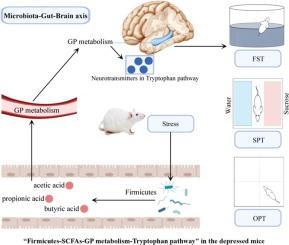Journal of Advanced Research ( IF 11.4 ) Pub Date : 2021-10-13 , DOI: 10.1016/j.jare.2021.10.002 Tian Tian 1 , Qiang Mao 2 , Jing Xie 3 , Ying Wang 4 , Wei-Hua Shao 5 , Qi Zhong 6 , Jian-Jun Chen 6

|
Introduction
Although researchers have done intensive research on depression, its pathogenesis is still not fully explained. More and more evidence suggests that gut microbiota is closely related to the onset of depression; but its specific functional ways are not clearly identified.
Objectives
The purpose of our work was to find out how the gut microbiota was involved in the onset of depression, and to identify the potential ways to link the gut and brain in mice with depressive-like behaviors (DLB).
Methods
We used the chronic restraint stress (CRS)-induced depression model here. Gut microbiota compositions in fecal samples, lipid metabolism (in fecal, serum and hippocampus samples) and neurotransmitters in hippocampus samples were detected.
Results
We found that the 7 of 13 differential genera that significantly correlated with DLB belonged to phylum Firmicutes. The differential lipid metabolites in fecal samples mainly belonged to glycerophospholipids (GP) and fatty acids (FA) metabolism, and three important “metabolite type-bacterial taxa” correlated pairs were identified: “FA/GP-Firmicutes”, “FA/GP-Akkermansia”, and “FA/GP-Bifidobacterium”. The key differential lipid metabolites significantly correlated with DLB mainly belonged to FA and GP, and the DLB-related metagenomic genes were consistently enriched in GP metabolism and FA metabolism. Three significantly changed short-chain fatty acids (SCFAs) were significantly correlated with the majority of differential genera. Meanwhile, we found that the differential lipid metabolites in serum and hippocampus samples were mainly mapped into the GP metabolism, and there were four differential neurotransmitters from the tryptophan pathway in hippocampus samples.
Conclusion
Together, our findings could provide novel insights into the role of “microbiota-gut-brain” (MGB) axis in depression, and indicate that the gut microbiota might have a vital role in the onset of DLB by affecting the peripheral/central GP metabolism and tryptophan pathway. The “Firmicutes-SCFAs-GP metabolism-Tryptophan pathway” might be a possible way to link the gut and brain in depressed mice.
中文翻译:

多组学数据揭示抑郁小鼠肠道菌群紊乱导致甘油磷脂代谢紊乱
介绍
尽管研究人员对抑郁症进行了深入研究,但其发病机制仍未完全阐明。越来越多的证据表明,肠道菌群与抑郁症的发病密切相关;但其具体的功能方式并没有明确标识。
目标
我们工作的目的是找出肠道微生物群如何参与抑郁症的发作,并确定将小鼠肠道和大脑与抑郁样行为 (DLB) 联系起来的潜在方法。
方法
我们在这里使用了慢性约束压力(CRS)诱导的抑郁模型。检测了粪便样本中的肠道微生物群组成、脂质代谢(粪便、血清和海马样本)和海马样本中的神经递质。
结果
我们发现与DLB显着相关的13个差异属中有7个属于厚壁菌门。粪便样品中的差异脂质代谢物主要属于甘油磷脂(GP)和脂肪酸(FA)代谢,鉴定出三个重要的“代谢物类型-细菌类群”相关对:“FA/GP-Firmicutes”、“FA/ GP-阿克曼氏菌”和“FA/GP-双歧杆菌”。与DLB显着相关的关键差异脂质代谢物主要属于FA和GP,与DLB相关的宏基因组基因在GP代谢和FA代谢中持续富集。三种显着变化的短链脂肪酸(SCFA)与大多数差异属显着相关。同时,我们发现血清和海马样本中的差异脂质代谢物主要映射到GP代谢,海马样本中色氨酸途径有四种差异神经递质。
结论
总之,我们的研究结果可以为“微生物-肠-脑”(MGB)轴在抑郁症中的作用提供新的见解,并表明肠道微生物群可能通过影响外周/中枢 GP 代谢在 DLB 的发病中发挥重要作用和色氨酸途径。“Firmicutes-SCFAs-GP代谢-色氨酸途径”可能是连接抑郁小鼠肠道和大脑的一种可能方式。











































 京公网安备 11010802027423号
京公网安备 11010802027423号